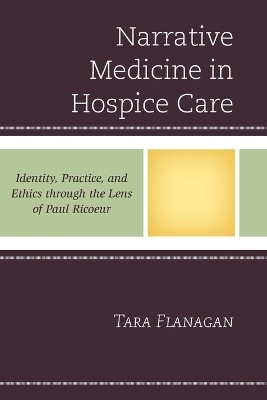
Narrative Medicine in Hospice Care
Identity, Practice, and Ethics through the Lens of Paul Ricoeur
Seiten
2023
Lexington Books (Verlag)
978-1-4985-5464-0 (ISBN)
Lexington Books (Verlag)
978-1-4985-5464-0 (ISBN)
Narrative Medicine in Hospice Care argues that the models of selfhood and care found in the work of Paul Ricoeur can serve as a framework for clinicians, caregivers, and end-of-life patients regardless of the patients’ verbal and cognitive capabilities.
Narrative medicine, an interdisciplinary field that brings together the studies of literature and medicine, offers both a way of understanding patient identity and a method for developing a clinician’s responsiveness to patients. While recognizing the value of narrative medicine in clinical encounters, including the ethical aspects of patient discourse, Tara Flanagan examines the limits of narrative practices for patients with cognitive and verbal deficits. In Narrative Medicine in Hospice Care: Identity, Practice, and Ethics through the Lens of Paul Ricoeur, Flanagan contends that the models of selfhood and care found in the work of Ricoeur can offer a framework for clinicians and caregivers regardless of the verbal and cognitive capabilities of a patient at the end of life. In particular, Ricoeur’s concept of patient identity connects with the narrative method of life review in hospice and offers an opportunity to address the religious and spiritual dimensions of the patient experience.
Narrative medicine, an interdisciplinary field that brings together the studies of literature and medicine, offers both a way of understanding patient identity and a method for developing a clinician’s responsiveness to patients. While recognizing the value of narrative medicine in clinical encounters, including the ethical aspects of patient discourse, Tara Flanagan examines the limits of narrative practices for patients with cognitive and verbal deficits. In Narrative Medicine in Hospice Care: Identity, Practice, and Ethics through the Lens of Paul Ricoeur, Flanagan contends that the models of selfhood and care found in the work of Ricoeur can offer a framework for clinicians and caregivers regardless of the verbal and cognitive capabilities of a patient at the end of life. In particular, Ricoeur’s concept of patient identity connects with the narrative method of life review in hospice and offers an opportunity to address the religious and spiritual dimensions of the patient experience.
Tara Flanagan is assistant professor of religious studies at Maria College.
Contents
Acknowledgements
Introduction
Chapter One: Narrative Medicine, Patient Identity, and Ethics through the Lens of Paul Ricoeur
Chapter Two: Narrative Identity and Practice in the Hospice Model of care
Chapter Three: Narrative Ethics and Practices from the Patient’s Perspective: Life Review as Ethical Self-Assessment
Chapter Four: The Limits of Narrative Medicine for End of Life Patients
Chapter Five: Expanding Beyond Narrative: Hospitality, Accompaniment, and Companioning as Models of Presence with Patients
Bibliography
About the Author
| Erscheinungsdatum | 12.04.2023 |
|---|---|
| Reihe/Serie | Studies in the Thought of Paul Ricoeur |
| Verlagsort | Lanham, MD |
| Sprache | englisch |
| Maße | 153 x 224 mm |
| Gewicht | 245 g |
| Themenwelt | Sachbuch/Ratgeber ► Gesundheit / Leben / Psychologie |
| Geisteswissenschaften ► Philosophie | |
| Religion / Theologie ► Christentum ► Kirchengeschichte | |
| ISBN-10 | 1-4985-5464-4 / 1498554644 |
| ISBN-13 | 978-1-4985-5464-0 / 9781498554640 |
| Zustand | Neuware |
| Haben Sie eine Frage zum Produkt? |
Mehr entdecken
aus dem Bereich
aus dem Bereich
von Athanasius bis Gregor dem Großen
Buch | Softcover (2024)
C.H.Beck (Verlag)
12,00 €
eine Geschichte der christlichen Kunst
Buch | Hardcover (2024)
C.H.Beck (Verlag)
32,00 €


